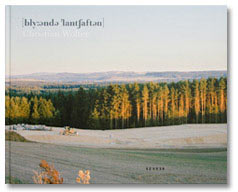Review: Blühende Landschaften by Christian Wolter
 On July 1, 1990, a few months before re-unification, (then West) German Chancellor Helmut Kohl addressed West and East Germans on TV and said “No one will be worse off than before - but many will be better off. […] If we work together, we will be able to turn Mecklenburg-Western Pommerania and Saxony-Anhalt, Brandenburg, Saxony, and Thuringia into blooming landscapes again, places where living and working really pays off.” It was not to be. One of the dirty secrets of the re-unification of Germany is that it was not run efficiently and well planned. A lot of money was spent, and the many infrastructure projects did create a short-lived economic boom, but a lot of money was wasted, poured into projects that nobody needed or needs; and the dismantling of East Germany’s ancient industries created large waste lands: blooming landscapes yet again, but with few people to enjoy it and a staggering rise in the number of political extremists, both to the very left (neo-Communist) and the very left (neo-Nazi).
On July 1, 1990, a few months before re-unification, (then West) German Chancellor Helmut Kohl addressed West and East Germans on TV and said “No one will be worse off than before - but many will be better off. […] If we work together, we will be able to turn Mecklenburg-Western Pommerania and Saxony-Anhalt, Brandenburg, Saxony, and Thuringia into blooming landscapes again, places where living and working really pays off.” It was not to be. One of the dirty secrets of the re-unification of Germany is that it was not run efficiently and well planned. A lot of money was spent, and the many infrastructure projects did create a short-lived economic boom, but a lot of money was wasted, poured into projects that nobody needed or needs; and the dismantling of East Germany’s ancient industries created large waste lands: blooming landscapes yet again, but with few people to enjoy it and a staggering rise in the number of political extremists, both to the very left (neo-Communist) and the very left (neo-Nazi).
Absurd and quickly abandoned infrastructure projects did not only happen in East Germany, but also in the Western part of the country. Photographer Christian Wolter set out to document some of them, the results of which were published in Blühende Landschaften (note: while the Amazon page talks of a “German edition” of the book, the one I have is German/English).
In Wolter’s photography you can see the hand of his teacher, Peter Bialobrzeski. It matches the hideously disfigured landscapes and modern ruins very well: Blühende Landschaften indeed. It seems what we have here is a universal phenomenon, when a lot of money to be spent meets greed, incompetence and negligence. Remember Alaska’s “Bridge to Nowhere”? Remember Japan’s destruction of a lot of its natural beauty to create bridges and streets that nobody needs? And it also seems as if ever expanding budgets - does anybody really understand what a trillion dollars means? - come with ever decreasing amounts of accountability. Billions of Dollars, Euros, Yens wasted? Who cares? In fact who really knows in a day and age when even major governmental accounting offices often are clueless where all the money went?
I see books like Blühende Landschaften as important reactions to all of this. They document what is going on, they provide an indictment of sorts, and then it is up to all of us to demand accountability. If we don’t ask for it, we are not going to get it - that much is certain.
At some stage, the evolving story of this type of documentary photography will have to be written - looking at its relationship to photojournalism, for example, or looking at how individuals grab their clunky large-format cameras, drive around in beat up cars, to present us with pictures of what is happening around us that we don’t get to see elsewhere. In the meantime, there are books like Blühende Landschaften to be enjoyed - if “to enjoy” is what one does when looking at desolate landscapes, created with our tax money, in our name, supposedly for us.